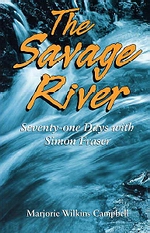We had to pass where no human being should venture."On the morning of May 28, 1808, Simon Fraser, two clerks, two Native guides, and nineteen voyageurs set out in four frail birch-bark canoes from For
We had to pass where no human being should venture."On the morning of May 28, 1808, Simon Fraser, two clerks, two Native guides, and nineteen voyageurs set out in four frail birch-bark canoes from Fort George on the Pacific slope of the Rocky Mountains. Before them was an unnamed and unexplored river that led south and, Fraser hoped, west to the Pacific coast. Every bend threatened new dangers - impassable rapids, treacherous portages, unfriendly Natives. But in seventy-one days, Fraser and his party fought their way to the mouth of the savage river and back to Fort George.
Fraser's journey on the river named for him is one of the most remarkable feats in the exploration of western Canada. Although Fraser failed to find the navigable canoe route to the Pacific, so desperately needed by the North West Company, his exploration helped to secure for Great Britain - and for Canada - the vast territory that became British Columbia.
The Savage River is a gripping account by award-winning author Marjorie Wilkins Campbell of one of the greatest adventures in Canadian history. First published in 1968, the book is based on Simon Fraser's journal of his remarkable journey on the river that bears his name.
Marjorie Wilkins Campbell
was the author of thirteen books for both adults and younger readers, including The Silent Song and The Savage River. She is a recipient of a Guggenheim Fellowship and a Member of the Order of Canada, and received two Governor General's Awards; the first in nonfiction for The Saskatchewan and the second in juvenile literature for The Nor'Westers.
View Biographical note
